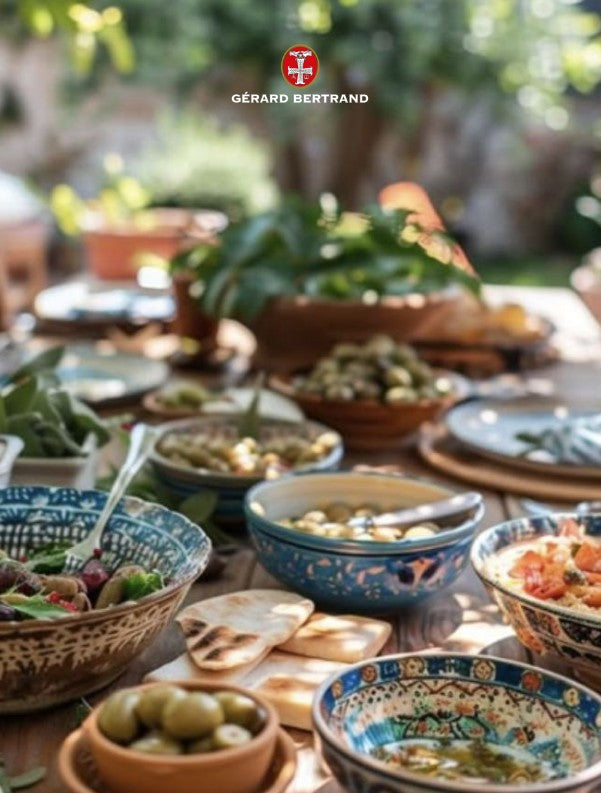The ideal wine in 4 questions
TAKE THE QUIZ



The rosé wine is a refreshing drink, often associated with sunny summer days. But did you know that to fully enjoy rosé wine, it's essential to store it properly?
In this article, we'll explore in detail how to store rosé wine, also touching on a few aspects of rosé wine making to better understand why certain storage conditions are crucial.

Before delving into wine storage tips, it is important to understand how making rosé wine. Contrary to popular belief, rosé wine is not simply a blend of red wine and white wine. The making of rosé wine relies on specific techniques that give it its delicate taste and characteristic color.
Rosé wine is made from black grapes, just like red wine. The difference lies in the length of time the grape skins are left in contact with the juice. For red wine, this contact lasts several days, while for rosé, it lasts just a few hours. This process extracts just enough color and flavor from the grape skins without giving the wine the robustness of a red. This method of making rosé wine explains why rosé is often lighter and fruitier than red wine.

How to preserve good rosé wine is more than just putting it in the fridge. There are several factors to consider to ensure that your rosé wine stays fresh and tasty for as long as possible.
Ideal temperature
Temperature is one of the most crucial factors in storing rosé wine. Ideally, rosé wine should be stored at a temperature of between 10°C and 12°C. If you don't have a wine cellar, a refrigerator may do the trick in the short term, but make sure the temperature doesn't drop below 8°C, as this could alter the wine's aromas.
Bottle position
The position of the bottle is also important for storing rosé wine. As with other types of wine, it is advisable to store rosé bottles lying down if they are corked. This allows the cork to remain moist, preventing air from entering the bottle, which could oxidize the wine and alter its taste.
Light protection
Le Languedoc rosé wine is particularly sensitive to light, especially direct sunlight. Prolonged exposure to light can degrade the wine, causing chemical changes that alter its taste and color. For this reason, we recommend storing bottles of rosé wine in a dark place, or in a wine cellar.
Controlled humidity
Humidity also plays a role in the preservation of rosé wine, especially if the bottles are sealed with cork. Too dry an environment can dry out the cork, allowing air to enter the bottle. Conversely, too much humidity can encourage the growth of mold. Ideally, humidity should be maintained at around 70%.

Once you've opened a bottle of rosé wine, the shelf life changes. The rosé wine begins to oxidize as soon as it comes into contact with air, which can alter its taste.
Use of a hermetic cap
After opening a bottle of rosé wine, it's essential to close it tightly to limit exposure to air. An airtight cap or vacuum pump can help remove air from the bottle, prolonging the wine's shelf life.
Refrigerator storage
Once opened, store rosé wine in the refrigerator. The cold slows down the oxidation process, thus prolonging the wine's shelf life. However, even with these precautions, it is recommended to consume opened rosé wine within three to five days of opening to fully appreciate its aromas and flavors.
Avoid temperature variations
One of the most common mistakes made when storing rosé wine is to leave it exposed to temperature variations. Frequent changes from hot to cold can cause the liquid to expand and contract, which can alter the quality of the wine.
Do not shake the bottle
Le rosé winelike any other wine, does not like to be shaken. This can lead to rapid oxidation and loss of flavor. It is therefore important to handle bottles of rosé wine with care.
Forgetting to drink wine on time
Finally, it's essential to remember that rosé wine is not generally designed for aging. Unlike some red or white wines, which can improve with age, rosé wine is intended to be consumed young, generally within two years of the production date.
Preserving rosé wine is a crucial step in fully appreciating this light, refreshing wine. By understanding the basics of making rosé wine and following the right storage advice, you can ensure that every bottle you open offers the optimum taste experience. So, the next time you open a bottle of rosé wine, remember these tips to prolong its freshness and pleasure.
Find out more about our rosé wine :

20 years ago, in the heart of the South of France, between the Pyrenees and the Mediterranean, an idea matured under the Languedoc sun: to reveal a new face of rosé. A delicate, crystalline wine, with a ...
Read the article
Barbecuing has never been so trendy. Braziers, plancha grills, traditional barbecues... they're inviting themselves into the heart of our summers, sublimating simple products in a convivial atmosphere. A fire, a few...
Read the article
Tapas & wine: the Mediterranean art of living A dinner with friends, plates to share, the scent of olive oil and rosemary... and wines selected to accompany this Mediterranean cuisine...
Read the article